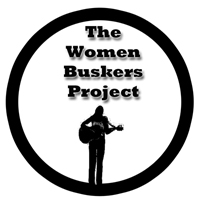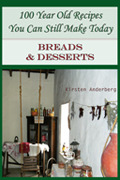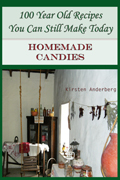
This article consists of two veteran women buskers' answers to a set of interview questions about the topic of busking. The interviewer, Kirsten Anderberg, has been a busker for over 30 years. The article is organized with the question being posed first, then the women's answers following each question. This organization allows the reader the most thorough means of comparison between the women's answers. There is so little documentation of women buskers' lives, throughout history, it is a void; I offer this article as one in a continuing series of women busker interview articles to try to at least leave a record of contemporary women street performers for future generations to enjoy.
The women buskers interviewed in this article are Mariide Widman from Seattle, WA (whom the interviewer, K.Anderberg, has known for decades); and Kathleen Winters from Seattle, WA (whom the interviewer has also known for decades). They answered these interview questions in Fall 2013. The women will be referred to by their initials in the answer sections of the questions below. For more interviews with women buskers, visit The Women Buskers Project at https://users.resist.ca/~kirstena/womenbuskersprojecthome.html.
1 - How long have you been a busker?
MW: Holy crow! Let me see 19 years at least…I started in 1979 or '81, when I started living at the "Growing Family" (in Seattle, WA), when I came back from Wazoo (Washington State University), so it could have been as early as '78 but I think it was '79. After finishing my Agriculture degree, I went to Wenatchee, WA, and they wouldn't let me buy a ranch due to sexism so I came back to Seattle and started working at "The Exit" ("The Last Exit" café in the University District) and got into busking because I ran the open mic there, and so I met buskers. Boys from "Mudhoney" (a well-known grunge band from Seattle) talked to me recently, and said they realized their first gig was at her Exit open mic.
KW: I began life as a street performer in 1983.
2 - How and where did you start street performing?
MW: I ran the open mic at The Exit, but the first time I did it and didn't take my job back, was on the road, riding the Green Tortoise (an alternative bus company run by hippies). I went back to San Francisco to live at Fisherman's Wharf on the historic "C.A. Thayer" ship. Then I went back to Seattle, and went back to work at The Exit. Then at the open mic, I met buskers. I learned part of the whole fighting to be allowed to play there on the road, from '82-'87 but I had busked before then. By the time I was back up in Seattle, I knew how to busk. I worked the Victoria museum system, and was one of first allowed to busk in Victoria harbor from 1986-'92.
KW: My partner and I landed in the Pike Place Public Market shortly before Easter in 1983, newly arrived from the east coast and a cross country drive. We were aware that there was busking going on, yet we originally planned to contract work through the forest service doing cabin maintenance and/or hoedad tree planting up in the mountains. When we arrived, we discovered that this was a state that required bonds on contracts, unlike Alaska at that time, and so we fell out into the market. We were so naive that we played at the far end of the north arcade. Surprisingly, nobody chased us off of that spot and we soon learned where the allowed spots were. We had been performing prior to that in other venues.

Mariide Widman, performing with Dave McKesson and Brian Youngberg at The History House of Greater Seattle
3 - What is your busking act?
MW: Mostly singer songwriter and folky tunes, instruments - I play a 9-string guitar with self-adjustments. I don't use the bottom 3 strings. The first busking act I had was "The Free Lunch Conspiracy" with David Mckesson, Liv, Skyla and Cindy Three Kids which lasted for a while, but everyone left eventually and I went back to San Francisco and learned mandolin, concertina, and sea music, due to maritime history music and museum work I was doing. I play English concertina, which is unusual because it is chromatic. I learned it because someone found it in a closet! A woman at The Exit found it on a back shelf and gave it to me. I was told when I asked what kind of musical instruments I should play, to "play what you get" - and that the concertina is priceless. It fascinated people in front of Seattle's Underground Tour. I was also in bands which were all women sea shanty groups which put out CDs. I also started performing as a singer-songwriter solo about 5 years ago. My age is not holding me back from busking, but I don't compete at The Pike Place Market because it is too crowded. I go to the Market to practice for summer, but I don't compete there because now there are like 300 buskers there and so I am using the city program for busking. People recognize me from all over the world when I busk.
KW: This never was an act. We were two people playing old time music together on our hammered dulcimers. As a couple, our energy was stronger than the sum of our separate parts and we rode a wave of street music during an incredibly vibrant period. Now I am a single woman who still busks from time to time, still on the hammered dulcimer, and still playing traditional music in a different time and space. You will notice that most of the commentary will refer to the past tense because I have recently returned to the scene. It is no longer the only thing I do.
4 - Do you think there is any difference between being a male or female street performer?
MW: No, I think everyone is their own person and all exploit whatever they can.
KW: The most important difference is in the need for carefulness that exists anytime a woman is out on the street and on her own. There really are some pesky and occasionally hazardous flies out there that need to be managed. Like most fields, the area is dominated by men until the women step forward. I have had no conflicts with male performers, or with the women. In my experience, a man will be chased off of an illegal spot quicker than I will be.
5 - Why do you think there are so few women street performers (as compared to men)?
MW: I think it reflects the number of women into performance in other realms too. The instinct to get out and caterwaul in front of folks is one thing and wanting to busk because you've seen someone else do it is another. It is just part of performance: either you have it or don't. Like interacting with kids and the public, some say busking is a form of begging and you might as well be shaking your cup. I don't believe that. I think it is an exchange, and that is reflected in patrons walking back 2 blocks to put money in my hat because I touched them. But mostly for me, it is catching the eye of children, and being able to expose them to the concertina and to music. It is part instinct. One of my lines is, "if everyone wanted to do the same thing, we would all be standing in the same line." The first time I got an ovation was in a play. I was playing the black mom in a play which was famous when I was in junior high, and when I finished singing the song, the audience clapped in the middle of the play for me. The next day, my parents took me out of it because they didn't like that I had "brought attention to myself" and they did not want me to be a performer/artist. My mom asked me on her death bed why they didn't know I was so talented and I asked her, "you don't remember?"
KW: There are still fewer woman performers in most fields of music, although that is slowly changing. It is a part of our cultural reality coupled with the transitions of the time. Waves of women entering fields is still emerging. There are more woman buskers now than in the earlier years...maybe.
6 - What is the most inspirational busker act you have ever seen?
MW: Because of Aspergers, dyslexic vision, etc., of all that inspired and took my breath away, the most inspirational were jugglers because I can't do that. I sang in the first University District Street Fair and the first time I ever saw jugglers fill up an intersection, so we couldn't walk, I was fascinated they could do that without speaking. I did that a bit in San Francisco and could play on the turnaround, not busking in Ghirardelli Square, playing concertina and mandolin to draw people into the park but the jugglers at the University Street Fair in 1967 blew your mind. The first time they shut down the whole street for it, may have been 1969, but the first time I really saw busking happen, I was just jamming at The Exit and other houses, still there, but not busking. The "Free Lunch Conspiracy" inspired me as buskers. The co-conspirators in that band inspired her. It was the first time I looked at it as something to do, as something to accomplish, when before it had just happened. This time what I set out to accomplish was to pay my rent. I was not healthy in Wazoo, so I got to Seattle, since I could not work doing what I wanted, running my own apple ranch in Wenatchee, and I had a BA in Agriculture with a minor in Chinese History in Wazoo. I wanted to be an apple rancher, I wanted a farm.
KW: Well, now that is a challenge. There have been so many incredible performers, I favor almost any of the juggling troupes that were half decent. Musically, I still have a fondness for hokum and strong old timey bands. We pulled the inspiration down through the music rather than through comparison with other groups. The inspiration was that we and they were able to do it and it worked.
7 - What is the worst busking act you have ever seen?
KW: Perhaps we could disregard this! Hmm, the lowest, if not the worst was the fellow under the clock at the market who had four wonky strings on his guitar, was dead drunk and needed to spit frequently...and also could not sing or play worth a hill of beans.
8 - What is your favorite tip ever received?
MW: My favorite tips are when merchants are so glad to see me that they tip me. If I play at Pike Place, rather than the alley, one lady always throws a $5 in my hat…
KW: Not sure! But those fifties thrown at Christmas were very helpful. The best tip possible is the act of a generous spirit in response to the music. The next best tips were the gigs that arose from busking; we had such a range of interesting events that spanned a wide variety of settings.
9 - Would you want your own children to busk? Why or why not?
MW: Yes, my greatgrandson just spent time busking. He was given every instrument he ever wanted to play and now is playing didgeridoo and guitar. He is busking this summer down the Pacific Coast. All kids should be given whatever instruments they want to play because now it has been proven and reported in New York Times in the Science Tuesday edition that music helps children and people learn. They are also using "Band Heroes," using music with PTSD vets, here now.
KW: I (and my x) are fine with that. Our son was out there with us, usually napping in his stroller in his early years. He has a great skill set using the rhythm sticks and yo-yos. He understands that the patter is the most important component for this type of performance should he take up busking as a lifestyle choice. In reality he is newly graduated with a political science degree and is currently working local ski slopes.
10 - What is the hardest part of busking? Getting or holding a pitch due to aggressive fellow buskers? Hatting the crowd? Hecklers? Street people, store owners or craft booth vendors bothering you? City regulations oppressive?
MW: Packing it up and getting it there…concertina in one hand, stool and guitar on roller and hand cart, but that is the hardest.
KW: All of the above are factors that create difficulties, which one is dominant depends on the venue. Usually, the fellow buskers are the least of my worries because we work it out. In areas where busking is disallowed, this clearly creates an oppressive reality. Busking still falls under the first amendment and so it is discouraging to have to deal with that lack of adherence to a given right. We never passed the hat or hawked our recordings- people paid and bought if they wanted. Our type of music rarely had hecklers and we were usually in the good with the crafts people. They all like the sound of the hammered dulcimer when they are not stuck listening to the same stuff over and over for long periods of time. Few people feel threatened by hammered dulcimer music in my experience.
11 - What advice would you give young women buskers just starting out?
MW: Remember to costume up and make eye contact with the kids…costume up meaning go to a thrift store and buy clothing that makes you stand out without hyper-sexuality. I woke up when I was taking care of my brother and married to Larry, the cop. I realized one fine morning that I had 3 changes of clothes and weighed 270 pounds. I decided to lose weight, and was so depressed. I went to a thrift store and gave myself permission to costume up and write music behind everybody's back. I began taking in foster kids in 1967. Lady Gaga tickles the fuck out of me. All the kids have ears on their hats, girls are sparkly - I think it is so great they get to do that and express themselves.
KW: Do not give up very quickly, make sure you get good feedback and you will need to be louder than you are accustomed to. Be safe, be persistent, build your network. Remember to tend to the basics, stay warm, dry and hydrated. Observe other buskers to develop a sense of what may work for you as far as managing crowds and cash.
12 - What differences have you experienced between different nationality busking acts (such as, are European buskers different than U.S. buskers, etc.? Have you noticed any differences between male and female busking acts?
MW: I think it's got more to do with the act, not nationality. I think balloon benders and card magicians are more aggressive than anyone else, and I'm not sure why. I think they have to work harder to get people to reach into their pockets. But mostly, I don't know why they do that but it has to do with needing the money. They're not the same as those guys who sing the gospel music, they come and tip me…they like my music.
KW: There seem to be a great many more one man bands in the European tradition, otherwise a minstrel's life is not all that different. The amount of geographical space that speaks one language in the US and Canada are significant factors. In general, men on the street have fewer safety concerns, there are still few larger groups of women, almost no women jugglers for example.
13 - Have you ever had to busk to be able to eat? Have you ever relied on busking for your rent? Did that make busking harder?
MW: No, as far as food, because the world won't let me go hungry. It's almost creepy. If I sing in Fremont, sushi people feed me. It is hard for me to go hungry. But yes in regards to busking to pay my rent. No, it doesn't make busking harder because I am a person of very few vices and I have always been careful with my dollars so it has always been easy to put rent away, then do what I want with money. But it is more an attitude that I carry a lot. I definitely am one of the thrifty folks. I consider it a luxury to buy $20 perfume and consider it a vice, but get it on sale.
KW: I worked as a busker to eat and pay rent for over ten years. We lived on a modest scale. It was what we did and the times were pretty good. We also took in a great variety of gigs and traveled to fairs and festivals that ranged from the Southwest up through the Arctic.
14 - What is the weirdest place/time you have ever busked in?
MW: So much of what I have done, when I stepped into it, I got a good reaction, like from Fisherman's Wharf and Ghirardelli Square. I was there before buskers were there. I had a ranger back-up. The third time I went back, long after those places were not in park service, and then tried to play the turnaround, I got told I could get back on the train, and so I went back and got the ranger and he set me up outside the gate of the Maritime Park, there in my own special little place. I had my own personal busking spot in between Fisherman's Wharf and Ghirardelli Square, guarded by the rangers, and they allowed me to sleep on the historic ship, even though it was not legal. They let me do it by setting me up with a $20 check as volunteer, and booked me on and off as the ship's cat.
KW: That would be now. It is more difficult to busk because the streets are very crowded with homeless people along with many more buskers - The economic and political climate of the time has created many challenges, even as easements have appeared through sponsored busking programs in airports and parks.
15 - Is there anything that would make you think of stopping busking?
MW: Physical disability and suffering from a lot of joint problems. I will probably eventually have to give it up due to those facts. I have grandkids to help but what I fear the most is physical disability. I am 71 years old. How I learned to sing in public without my parents knowing was in high school, in Grants Pass, Oregon, The Sugar Shack Café, was across the street (from the high school) and I would walk in and the kids sitting at table in front of juke box would move so I, and these boys, could sit there and wait at the window for other kids who would put money in the juke box. The boys chose the songs, and I learned to sing with the Everly Brothers. I didn't know how amazing it was but people in the café would put more money for the Everly Brothers in juke box when I would sing with them.
KW: I did stop busking for a number of years. My son was growing larger, my partner had moved onto other interests and did not want to play out anymore. I went back to school the first time and took my first degree (I finished a new degree last June, 2013.) I never wanted to stop but that was how it was within the family framework. Now, the time of raising a family and caring for elders is completed so I am able to go out from time to time. It really all depends on my energy levels and the weather. Otherwise, no. I love the pleasure of live experience through busking and of course, good tips help too.
You can find Mariide's music at http://www.mariide.com/RightWingRadicalHippie.
To find a copies of Kathleen Winter's music, visit WorldCat and enter your zip code. It will tell you the nearest library of availability.
Return to the Women Buskers' Project Home Page
Thank you to Resist.ca for hosting this website!




